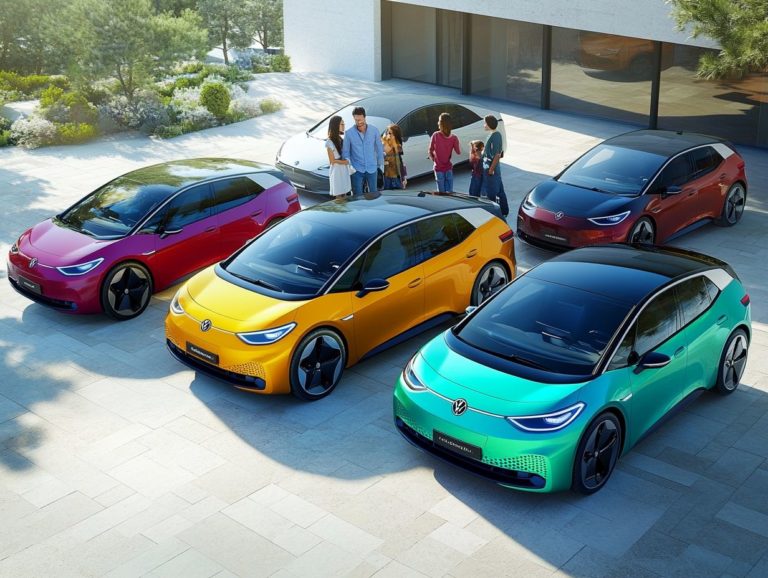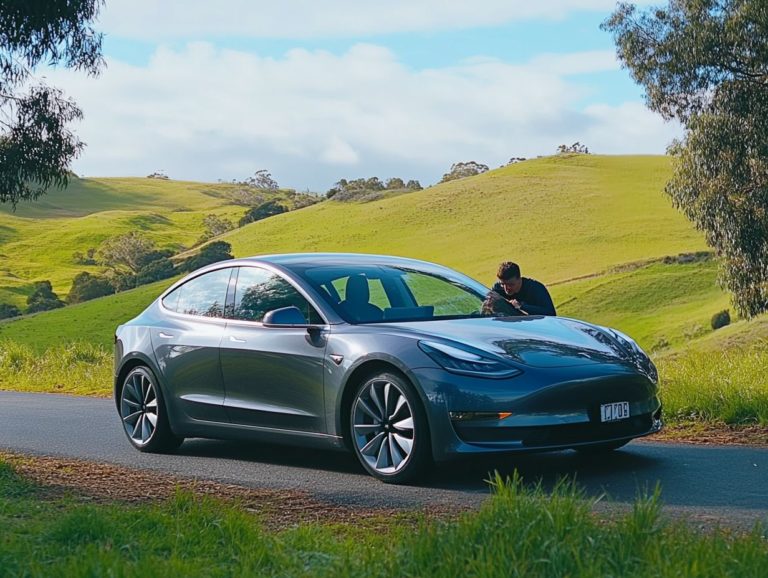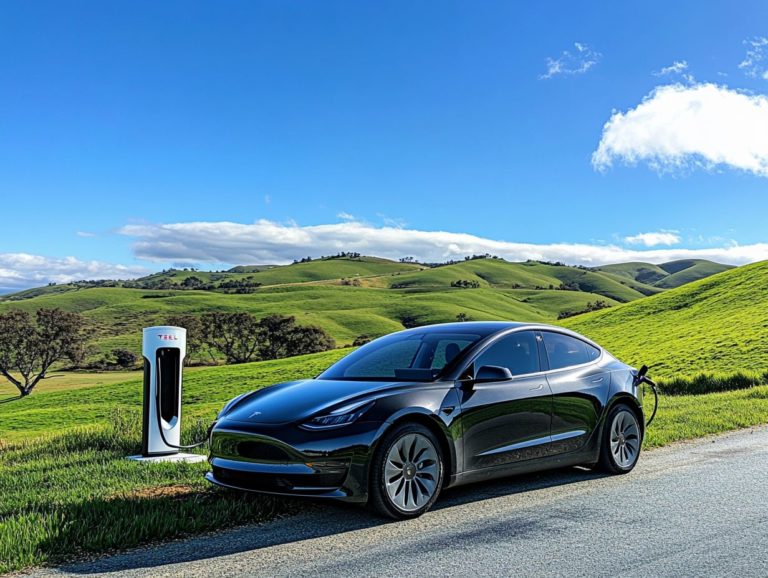The Future of Electric Trucks: What to Expect
As the automotive industry transitions toward sustainability, electric trucks are poised to revolutionize transportation.
This article delves into the essence of electric trucks, showcasing their significant environmental benefits and impressive cost savings. You’ll discover the current landscape, featuring key players and addressing the challenges they face, while also looking ahead to technological advancements and expected market growth.
The discussion extends to the potential impact on the trucking industry, considering everything from operational changes to implications for the workforce.
Join us in exploring the future of electric trucks and their transformative potential, and see how they could reshape the industry landscape.
Contents
- Key Takeaways:
- Benefits of Electric Trucks
- Current State of Electric Trucks
- The Future of Electric Trucks
- Impact on the Trucking Industry
- Frequently Asked Questions
- Curious about electric trucks? Here are some common questions answered!
- What is the current state of electric trucks in the market?
- What are some advantages of electric trucks compared to traditional diesel trucks?
- What are some challenges that electric trucks face in terms of widespread adoption?
- What can we expect in terms of battery technology for electric trucks in the future?
- Will electric trucks completely replace diesel trucks in the future?
- What are some potential environmental benefits of widespread electric truck adoption?
Key Takeaways:
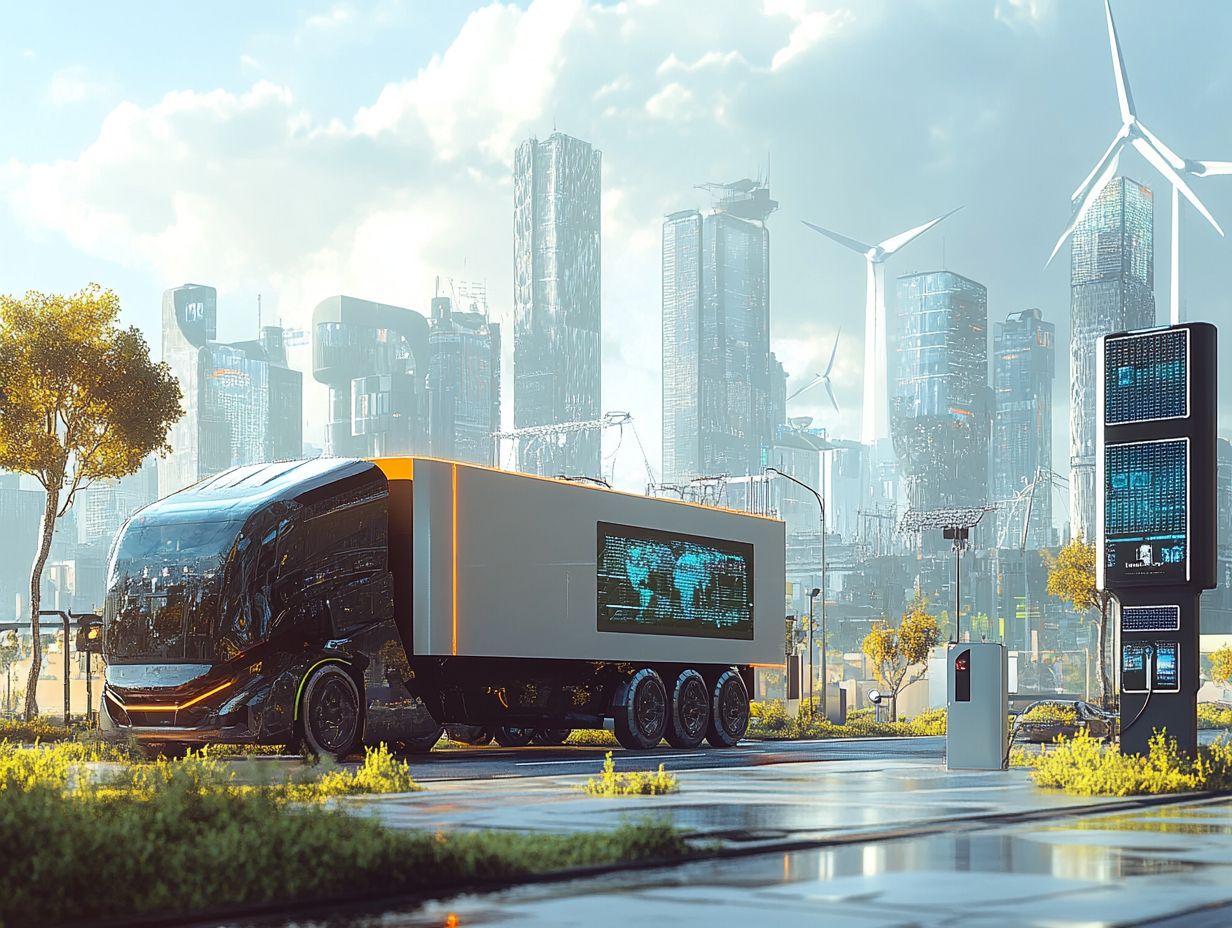
- Electric trucks offer significant benefits, including reducing environmental impact and cost savings.
- While challenges and limitations exist, technological advancements and potential market growth show promise for the future.
- The rise of electric trucks will greatly impact the trucking industry, with changes in operations and logistics, and potential shifts in the job market.
Discover the Power of Electric Trucks
Electric trucks are your gateway to a more sustainable future, powered primarily by electric motors instead of traditional internal combustion engines. They re designed to meet emission standards and deliver impressive performance, offering maximum towing capacity and immediate torque.
Whether you’re navigating daily commutes or tackling heavy-duty applications, these trucks are versatile, often incorporating hybrid systems for enhanced efficiency.
Beyond their remarkable zero or low-emission capabilities, electric trucks have made impressive advancements in charging technologies. You can now enjoy faster charging times and extended ranges, making them even more practical.
Among the options available, you ll find battery electric trucks that run entirely on electric power, and plug-in hybrids that combine electric motors with traditional gasoline engines for added flexibility.
This innovative approach reduces reliance on fossil fuels while providing superior acceleration and lower maintenance costs compared to conventional trucks. As a result, electric options are becoming increasingly appealing to both fleet operators and environmentally conscious consumers.
Benefits of Electric Trucks
Electric trucks present a wealth of advantages, including lower maintenance costs, improved cost efficiency, and a substantial decrease in environmental impact. This combination makes them increasingly favored in the contemporary trucking industry, especially as they meet more stringent emission standards.
Environmental Impact
The environmental impact of electric trucks is remarkably more favorable than that of traditional internal combustion engines. They produce zero tailpipe emissions, contributing to cleaner air quality and ensuring compliance with stringent emission standards.
Transitioning to electric vehicles is crucial for achieving sustainability goals, especially since transportation is a major contributor to greenhouse gas emissions.
For example, a study by the Union of Concerned Scientists indicates that electric trucks can reduce emissions by up to 70% over their lifetime compared to diesel options.
Major logistics companies are increasingly embracing electric fleets. A leading delivery service reported an impressive reduction of 3,000 tons of CO2 emissions annually after integrating electric models into their operations.
By adopting such vehicles, you not only enhance your carbon footprint but also align with state and federal initiatives aimed at fostering a greener economy and mitigating climate change impacts.
Cost Savings
Investing in electric trucks can lead to significant cost savings over time. This is largely due to lower maintenance costs, reduced fuel expenses, and government incentives that promote electric vehicle adoption.
Electric trucks typically require less frequent servicing than conventional vehicles. With fewer moving parts, you can say goodbye to oil changes and enjoy less brake wear because of regenerative braking systems, which help to recharge the vehicle while slowing down.
The fuel savings from charging electric trucks can be impressive. Electricity costs are generally lower than diesel prices, especially with the increasing number of fast-charging stations available.
Various federal and state programs offer tax rebates and credits that can further offset your initial investment. This makes the transition to electric trucks not only environmentally friendly but also a wise financial move.
Current State of Electric Trucks
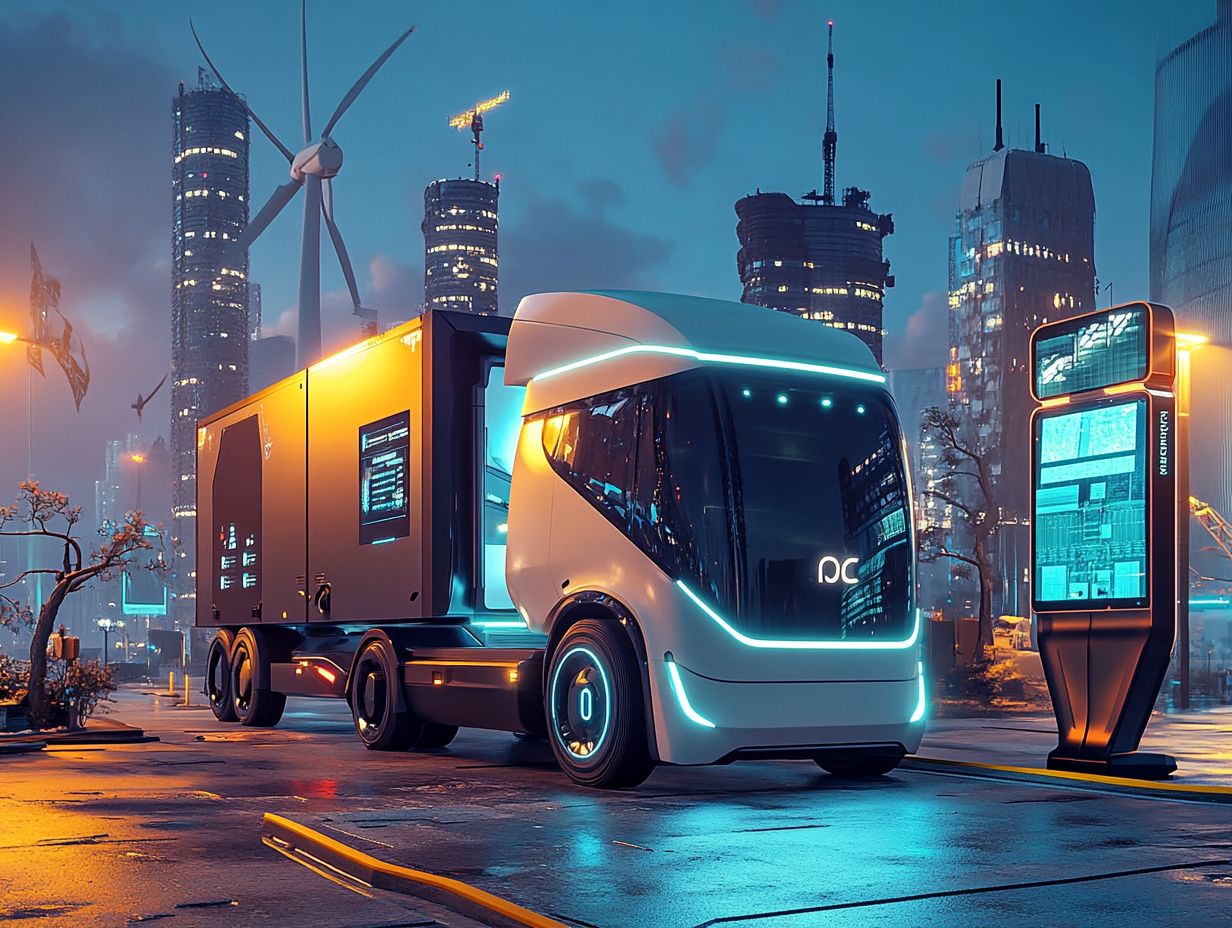
Electric trucks are transforming the market! The current landscape showcases a dynamic and swiftly evolving sector. Major players like Tesla, Ford, Rivian, and GM are making waves with innovative models such as the Ford F-150 Lightning and the GMC Sierra EV.
These advancements are not merely trends; they are reshaping the traditional truck market in profound ways.
Major Players in the Market
The electric truck market is bustling, dominated by key players like Ford, Rivian, GM, and Tesla. Each manufacturer offers unique models tailored to meet diverse needs and preferences, such as the Ford F-150 Lightning and the Tesla Cybertruck.
These companies focus not just on performance and range; innovation is at the forefront. They are making advancements in battery technology and sustainable materials. For example, Rivian s R1T is turning heads with impressive off-road capabilities and customizable features, perfect for the adventure-seeker.
Meanwhile, GM leverages its established brand loyalty, nudging traditional truck enthusiasts toward electric alternatives like the GMC Hummer EV. Each of these companies is strategically positioning itself to capture a slice of this rapidly expanding market, showcasing the value of green technology while meeting the practical demands of today s truck users.
Challenges and Limitations
Electric trucks come with numerous advantages, but they also face significant challenges and limitations. Range issues and complexities related to charging capabilities can impact both cost efficiency and consumer adoption.
As the industry advances, obstacles like technological limitations hinder battery efficiency and overall performance. Range anxiety is a common concern among potential users, who often worry about completing long hauls without frequent charging stops. The current lack of a robust charging infrastructure intensifies these worries, making it difficult for fleet operators to rely on electric trucks for logistics.
Without widespread access to fast-charging stations, businesses may be reluctant to transition from traditional diesel trucks, which offer greater operational predictability. Additionally, the higher initial investment associated with electric vehicles poses a barrier, discouraging many from embracing this shift.
The Future of Electric Trucks
The future of electric trucks is set for impressive growth, driven by anticipated technological advancements and rising market demand. This growth is especially true for hybrids that seamlessly combine traditional performance with electric capabilities.
Expected Technological Advancements
You can expect remarkable advancements in electric trucks, including enhancements in battery efficiency, faster charging capabilities, and more powerful electric motors. These improvements will significantly elevate the performance and usability of these vehicles.
Innovations like solid-state batteries are on the horizon, promising substantially higher energy densities than traditional lithium-ion options. This means you ll enjoy longer ranges and shorter charging times.
The transition to integrated powertrains, which combine various power sources into one system, will also lead to lighter, more compact designs, enhancing the agility of your trucks.
Companies are exploring regenerative braking systems that conserve energy and extend the lifespan of the vehicle. As a result, you could see reduced downtime and maintenance costs. This makes electric trucks a wise choice that is both eco-friendly and financially savvy for the future.
Potential Market Growth
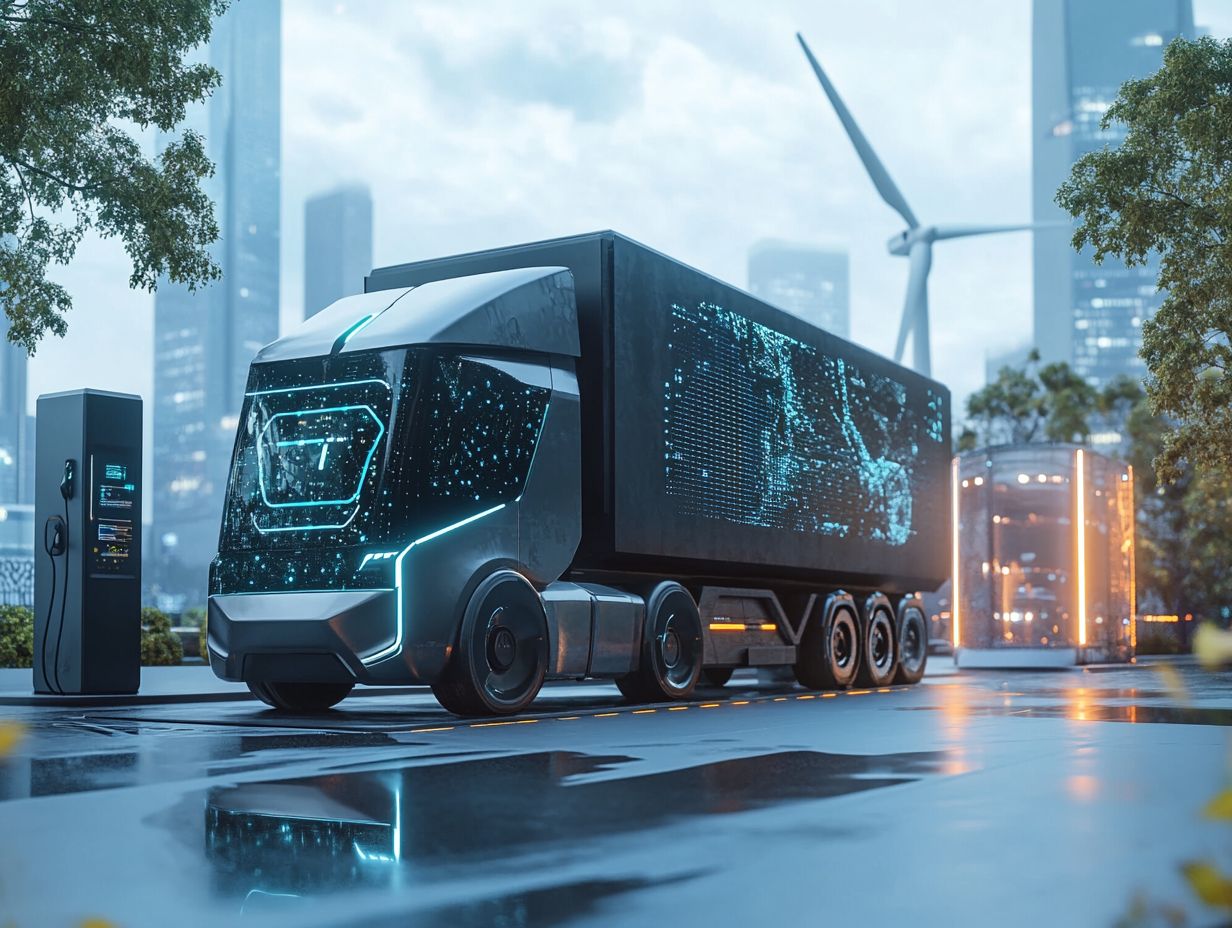
The potential market growth for electric trucks is remarkable. Analysts from reputable firms like Bloomberg New Energy Finance and Goldman Sachs project a robust demand trajectory in the truck market for the coming decades.
This positive outlook stems from key drivers such as stringent emissions regulations, advancements in battery technologies, and increasing cost advantages over traditional diesel trucks. Research shows that businesses are shifting toward more sustainable logistics solutions, marking a critical industry shift.
Reports suggest that by 2040, electric trucks could capture a significant share of total vehicle sales, fundamentally reshaping the transport ecosystem. Investments in charging infrastructure and government incentives are bolstering this evolving landscape, making electric trucks increasingly attractive for fleet operators and logistics providers.
Impact on the Trucking Industry
Electric trucks are set to revolutionize the trucking industry, impacting not just vehicle technology but also reshaping the job market and workforce dynamics. As companies shift from internal combustion engines to electric alternatives, significant changes will redefine how the industry operates.
Changes in Operations and Logistics
The integration of electric trucks into your operations and logistics strategies offers exciting opportunities and formidable challenges. You’ll need to adapt to new performance measures and operational efficiencies that hybrid systems introduce.
As the logistics landscape evolves, you might explore the potential of electric vehicles to reduce your carbon footprint while enhancing delivery speed and reliability. Major corporations like Amazon and Walmart set the standard, deploying fleets of electric trucks that support sustainability goals while streamlining their supply chain processes.
For instance, Amazon s investment in electric delivery vans underscores a strong commitment to achieving net-zero carbon emissions by 2040. You may also need to re-evaluate your routing strategies and maintenance practices, utilizing technology to optimize performance and seamlessly integrate these innovations into your existing frameworks.
Job Market and Workforce Changes
The transition to electric trucks is set to create significant shifts in the job market. You ll soon need new skills to maintain and operate these vehicles, potentially reducing roles tied to traditional internal combustion engines.
This shift is likely to impact your workforce in various ways. There will be a growing necessity for training programs that focus specifically on electric vehicle technology and maintenance. If you re currently employed in the trucking industry, you ll be excited to adapt to these thrilling changes, which could increase the demand for specialized technicians skilled in managing the truck’s power source and electric drive systems.
While some traditional trucking jobs may diminish, the rise of electric trucks could open new opportunities in logistics, infrastructure development, and energy management. This creates a dual path of job creation and displacement that you ll want to navigate carefully.
Frequently Asked Questions
Curious about electric trucks? Here are some common questions answered!
What is the current state of electric trucks in the market?
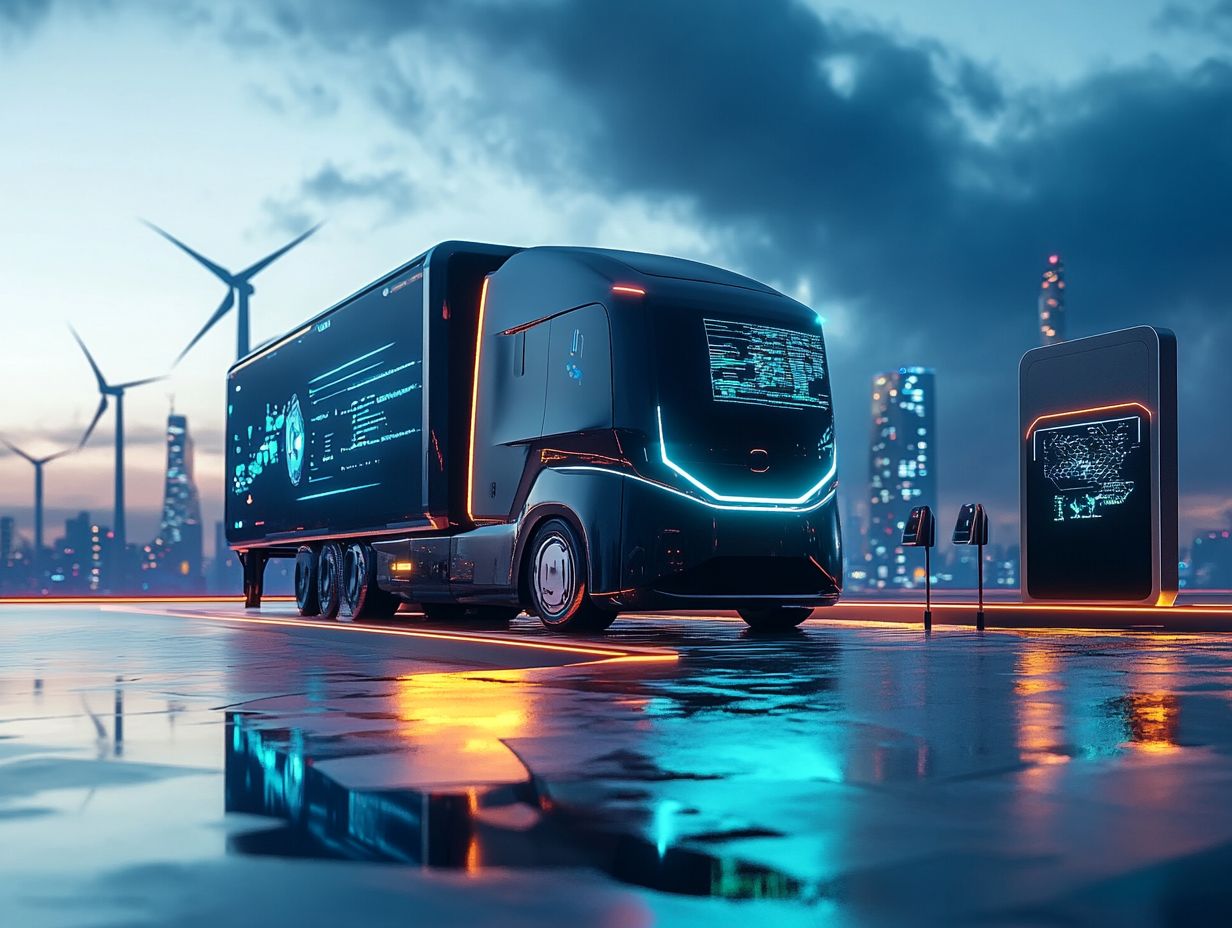
Currently, electric trucks make up a small percentage of the overall truck market. However, their popularity is steadily growing as more companies and governments push for sustainable transportation options.
What are some advantages of electric trucks compared to traditional diesel trucks?
Electric trucks have lower operating costs, emit zero emissions, and require significantly less maintenance due to their simpler design.
What are some challenges that electric trucks face in terms of widespread adoption?
The main challenges include limited range, high upfront costs, and a lack of charging infrastructure. However, advancements in battery technology and government support are helping to address these issues.
What can we expect in terms of battery technology for electric trucks in the future?
We can expect continued progress in battery technology, with companies investing in research and development to improve range and charging times. Solutions like solid-state batteries are also being explored.
Will electric trucks completely replace diesel trucks in the future?
It is unlikely that electric trucks will completely replace diesel trucks. There will still be a need for specialized vehicles and long-haul transportation. However, electric trucks are expected to become increasingly common and will likely make up a significant portion of the truck market.
What are some potential environmental benefits of widespread electric truck adoption?
With zero emissions, electric trucks can help reduce air pollution and greenhouse gas emissions. This leads to improved air quality and a more sustainable future. They can also help reduce dependence on fossil fuels and decrease noise pollution in urban areas.
Ready to learn more about electric trucks or join training programs to prepare for the shift? Stay informed and get involved!


